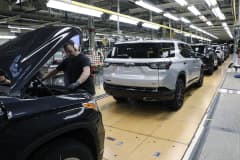DETROIT – U.S. auto sales are expected to nosedive in September, driving purchases of new vehicles down in the third quarter by at least 13% as the chip shortage continues to disrupt production, new industry estimates show.
Forecasts from Cox Automotive, Edmunds and J.D. Power/LMC Automotive predict vehicle sales from July through September were less than 3.4 million, down between 13% and 14% from the same time last year when volumes were depressed due to the coronavirus pandemic.
The severe decline, including an expected 24% to 26% fall in September, is due to the ongoing shortage of semiconductor chips for new vehicles.
The parts shortage has caused automakers to sporadically shutter plants for weeks, if not months. The lack of production combined with strong consumer demand has caused vehicle inventories to plummet to record lows.
“The entire U.S. auto industry — including the Asian manufacturers, which were doing a bit better than their domestic counterparts until recently — is in an incredibly volatile position right now and we are seeing inflated retail prices across the board,” said Jessica Caldwell, executive director of insights at Edmunds.
The inventory shortages have worsened throughout the year. Forecasters expects only 1 million vehicles to be sold in September, which Cox Automotive reports would be among the lowest volume in the past decade.
The sales pace in the U.S. market has fallen every month since reaching a peak of 18.3 million in April. It’s expected to be 12.1 million to 12.2 million in September.
Cox analysts predicts vehicle supply will improve mildly in the fourth quarter, and continue to improve throughout 2022, but won’t return to “normal” until 2023 – if ever. Automakers have promised to keep leaner inventories in the future to boost vehicle profits and prices, which have been at record levels.
J.D. Power expects average transaction prices will reach a new record of $42,802 in September, marking a fourth consecutive month over $40,000.
Read more
“The mismatch between strong consumer demand and constrained inventory is leading to higher vehicle prices,” said Thomas King, president of the data and analytics division at J.D. Power.
The majority of automakers who sell vehicles in the U.S. are scheduled to report third-quarter sales on Friday. Ford Motor is expected to report sales on Monday.
Edmunds expects General Motors and Ford to have the largest third-quarter sales declines of 31.5% and 29.3%, respectively. An outlier for the quarter is anticipated to be Hyundai/Kia, which Edmunds forecasts will be up by 10.1%. Cox Automotive also expects Tesla’s third-quarter sales to be up by about 26%.



